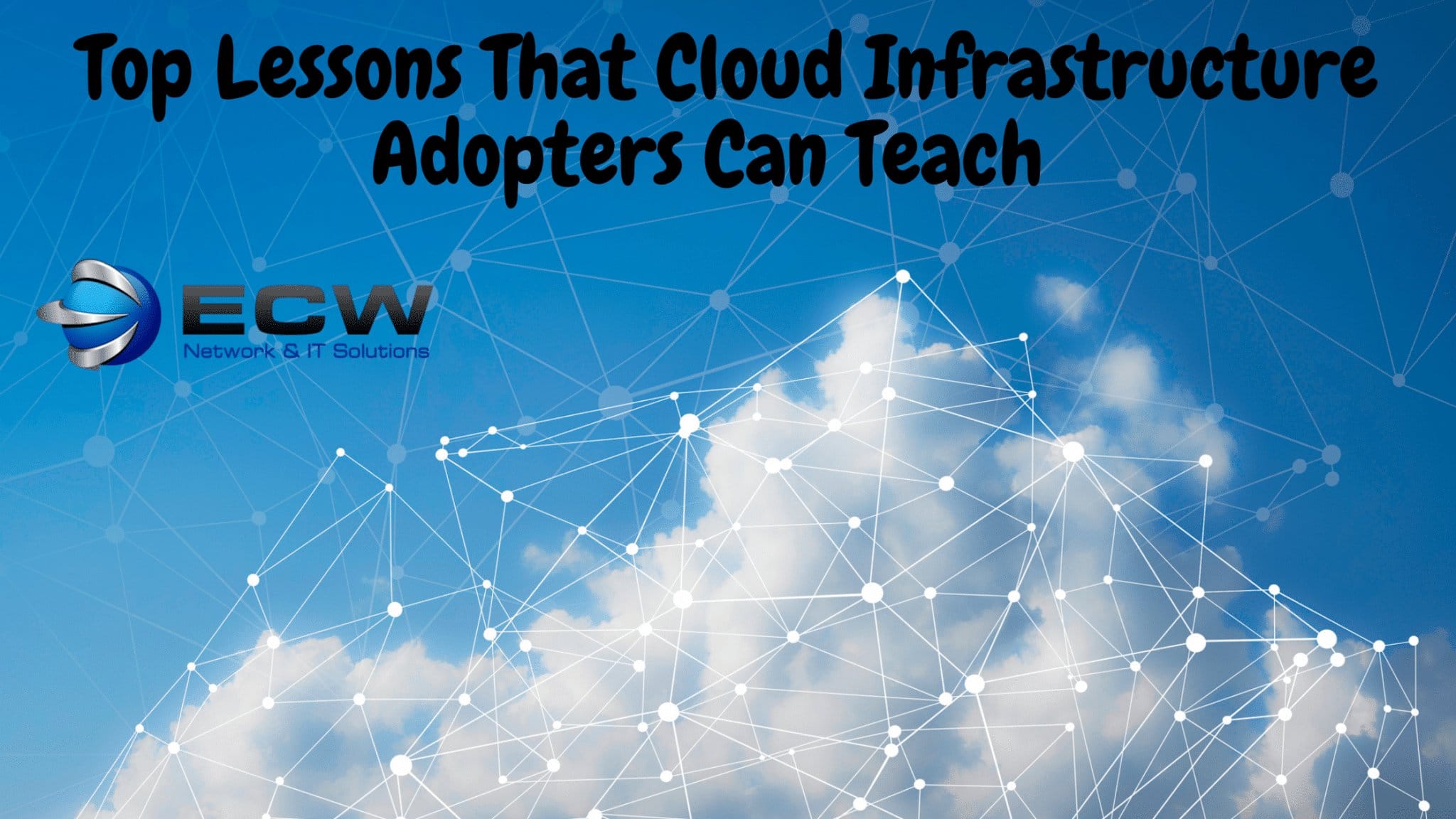
Top Lessons That Cloud Infrastructure Adopters Can Teach
Top Lessons That Cloud Infrastructure Adopters Can Teach
The cloud is far from a new concept in the business world. As of 2019, the RightScale State of the Cloud Report revealed that 91 percent of respondents used the public cloud in some capacity. Cloud adoption is expected these days, but merely taking advantage of the cloud isn’t enough. It’s important to implement cloud solutions strategically to ensure the best possible service and security. Previous cloud adopters can provide plenty of valuable lessons for those in the midst of choosing a provider and general cloud approach.

A Cloud Center of Excellence Is Essential
A cloud center of excellence (CCoE) offers a helpful framework for moving forward with various cloud solutions. The concept at the heart of a successful CCoE involves a dedicated team responsible for building cloud organization frameworks, maintaining IT infrastructure, and developing best practices for cloud functions. Ideally, this team will include developers, database administrators, and other experts eager to influence cloud practices. This team should have defined objectives, as well as plenty of resources and support to ensure that its goals are within reach.
Areas of focus may differ between organizations. In most cases, however, the CCoE will emphasize governance tools and protocol, cloud provider selection, contract negotiation, and dissemination of best practices across the organization. The overarching mission should involve transforming cloud operations to ensure the best possible service and return on investment.
Private and Hybrid Solutions Are Worth Exploring
If the RightScale survey referenced above is any indication, the public cloud is a popular solution for a wide array of businesses. The appeal is obvious: public cloud solutions are convenient and affordable. They can be implemented quickly to provide easy access to important data. In most cases, businesses opting for this approach can avoid the startup costs that accompany other options.
While the public cloud offers numerous benefits, it’s often more effective when combined with private options that offer enhanced security. It is perhaps for this reason that 72 percent of those involved in the aforementioned survey claimed to use private cloud solutions, while 69 percent opted for a hybrid approach. The study’s results reveal that only 22 percent of businesses exclusively use public cloud solutions.
Private and hybrid options deliver a greater degree of control over cloud functionality. This is important not only for enhancing security when dealing with sensitive data, but also for purposes of regulatory compliance. Ultimately, no one cloud approach is ideal in every situation, so it’s important to examine a broad range of options before settling on a specific solution.
Public Cloud Selection Matters
While different types of businesses can benefit from maintaining different workloads via public, private, or hybrid cloud setups, all require extensive vetting to ensure that providers are trustworthy. This is especially true for businesses that limit most functions to the public cloud. When sensitive data is stored and accessed in this capacity, it is crucial to work with a respected provider capable of minimizing security risks.
Business leaders who blindly enter agreements without thoroughly vetting their options may come to regret this approach. Such negligence can leave organizations uniquely vulnerable to everything from malware infections to distributed denial of service (DDoS) attacks.
A variety of factors should be taken into account when selecting a cloud service provider. These include:
- Architecture. Sometimes, convenience dominates. Many cloud solutions are specifically designed to be compatible with existing infrastructure. In such situations, workflows will prove far easier to maintain under a compatible structure.
- Security. This should be one of the most important considerations when choosing a cloud solution. Take a close look at the specific security features offered by top candidates, comparing and contrasting based on current threats. It’s important to understand where each party might hold responsibility under a particular provider — and how security coverage might differ based on the pay structure. Some providers offer limited security features free out-of-the-box, focusing on more extensive security solutions with paid subscriptions models. In other cases, all users enjoy comprehensive access to security features.
- Compliance. Consider the current standards that apply to specific industries or regions. Cloud providers should be fully compliant with these. Depending on the situation, frameworks worth examining may include the Health Insurance Portability and Accountability Act (HIPAA), Payment Card Industry Data Security Standard (PCI DSS), or the General Data Protection Regulation (GDPR).
- Support. When cloud issues arise, prompt assistance is essential. Unfortunately, some cloud providers fail to provide the swift support businesses require. Determine in advance if assistance will be provided through a call center, a chat application, or some other approach.
Be Prepared to Evolve
Cloud solutions should be adopted with the full expectation that approaches will shift over time. The current cloud looks little like it did even a few years ago — and changes of a similar scale should be expected for the next several years.
The businesses that use the cloud also change quickly. Swift growth is always possible, making scalable solutions essential in today’s rapidly evolving environment. Hence, the value of public and hybrid cloud options, which can grow alongside organizations.
Plans for governing and managing cloud resources should address the possibility of significant changes over time. Previous on-premises management solutions will not prove sufficient for cloud-based approaches, so it’s important to integrate resources and develop flexible practices early on.
Ready to move forward with a trusted IT service provider? Look no further than ECW Computers. Contact us today to learn more about our cloud hosting and managed IT services.





